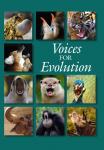
The chorus of support for the teaching of evolution continues, with three statements from the American Society of Plant Taxonomists, the American Statistical Association, and the Union for Reform Judaism.
In its statement, the American Society of Plant Taxonomists endorses "the use of evolution in the scholarship of its members and supports teaching this theory in schools, colleges and universities," adding, "As educators, we believe that evolution is an essential component of science education. In the absence of an evolutionary context, our understanding of the origin and complexity of the earth’s biodiversity and our ability to realize critical advances in medicine and agriculture would not be possible. Acknowledging our obligations as scientists and educators, we join the many other scientific societies that have endorsed the role of evolution as a unifying principle both in scientific scholarship and science curricula at all educational levels."
The American Statistical Association, according to its statement, "takes no position on whether intelligent design is right or wrong. Nevertheless, it is clear that intelligent design is not a scientific theory subject to empirical testing, and thus has no place in science education." It therefore resolved, "Intelligent design should not be taught as part of any science curriculum," adding, "Further, the Association urges its members to continue to support vigorously those principles of inquiry and verification that characterize sound scientific practice." (The statement was published in Amstat News, the monthly membership magazine of the ASA, in 2006, and seems not to be presently available on the ASA's website.)
And the Union for Reform Judaism, noting that "the overwhelming majority of the scientific community, which supports theories that are testable by experiment or observation, oppose treating ['intelligent design'], which is neither, as scientific theory. A 1999 report by the National Academy of Sciences states, 'Creationism, intelligent design, and other claims of supernatural intervention in the origin of life or of species are not science because they are not testable by the methods of science," resolved to "[o]ppose government efforts and policies that seek to redefine science or the scientific method to incorporate religious, theological or other theories, including "intelligent design" and creationism, that are neither testable by experiment nor observation."
Also of interest, although not addressing biological evolution, is a statement by the Affiliation of Christian Geologists on the physical age of the earth and universe, reading (PDF), in part, "... the scientific evidence clearly favors a vast age for the earth and the universe. Current scientific calculations indicate that the universe began about 13 billion years ago and the earth about 4.6 billion years ago. These conclusions are based on cumulative evidence and are refined with each new study. ... Although Scripture contains essential information on origins that gives meaning and perspective, technical details of the method and timing of creation are not major concerns of the Biblical text, and many orthodox theologians do not see a conflict between the Bible and an old creation."
All four of these statements are reproduced, by permission, on NCSE's website, and will also be contained in the fourth edition of NCSE's Voices for Evolution.
